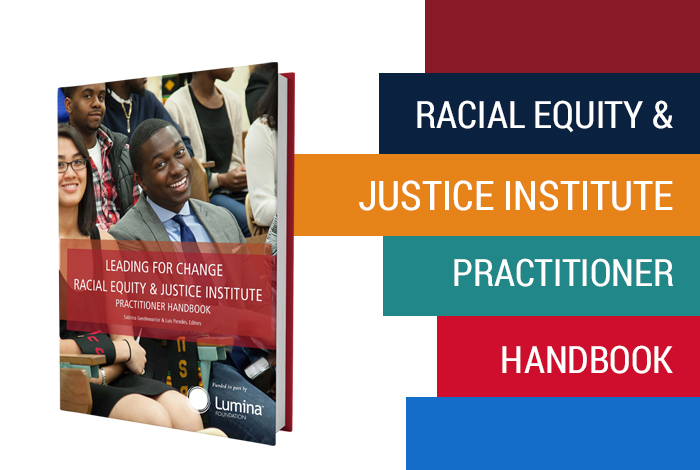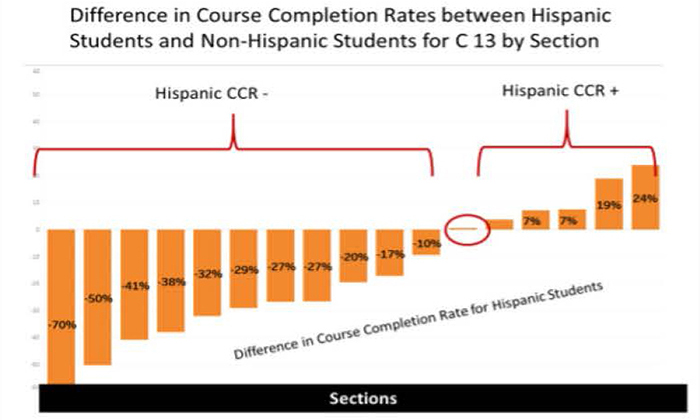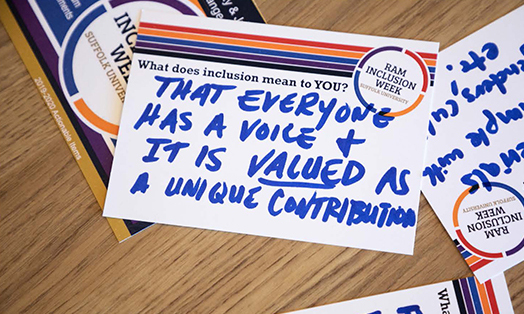
On September 21, 2021, the Racial Equity and Justice Institute, a multi-institution collaborative housed at Bridgewater State University, released a critically important work to move campus efforts toward racial equity: the Leading for Change Racial Equity and Justice Institute Practitioner Handbook.
The release of this REJI handbook is an important part of a widening collaboration toward racial equity and justice in higher education, providing accessible detail on emerging practices with reach across the region and far beyond. The handbook was composed with the intention that it may be accessed by any practitioner or institution seeking racial equity in higher education—for free.
The handbook features 26 chapters focused on racial practices and strategies for campuses engaged in equity-minded inquiry and moving toward confronting and dismantling the barriers placed before racially minoritized students as they pursue higher education. It includes chapters focused on racially equitable data practices, campus programming, student service provision, academic excellence, and racially just policing. In over 200 pages, the document details focused, intentional examples of real strategies carried out by practitioners on campuses throughout the region—those who are putting into actual practice, in partnership with their students, the work necessary to transform institutions toward racial equity.
The Leading for Change Racial Equity and Justice Institute (REJI) is a voluntary collaboration of 30 New England campuses and a team from DHE, housed at Bridgewater State University (BSU) since 2014 and convened by Dr. Sabrina Gentlewarrior, BSU Vice President for Student Success and Diversity. The work of the REJI and this handbook demonstrates the critical partnership of institutions across the Commonwealth and the region working to eradicate the persistent systemic racism embedded institutionally. The handbook project was funded in part by the Lumina Foundation Massachusetts Equity Institutions grant administered by DHE, which awarded grants to six Massachusetts public community colleges and universities (including BSU), and the Boston Foundation to support the Massachusetts ecosystem to achieve the goals of the Equity Agenda.
The introductory chapter of the handbook features reflections from Commissioner Carlos E. Santiago, Bridgewater State President Fred Clark, and former Greenfield Community College President Yves Salomon-Fernández, which help provide a framing in the context of equity-minded leadership.
“Increasing the educational attainment of the Massachusetts population segments that are growing (racially minoritized populations) is a critical strategy for achieving social justice and empowerment, and economic viability in the long run.”
— Carlos E. Santiago, Commissioner of Higher Education
Commissioner Santiago gives voice to what is at stake in this moment, describing the drivers and strategy of the Equity Agenda in the frame of current and historical context in Massachusetts. He reminds readers that “[t]he promise of democracy and the reality of systemic racism are antithetical. Yet, they have coexisted since before the founding of the country. . . There is no way of morally justifying this continued state of affairs.” And makes clear that “increasing the educational attainment of the Massachusetts population segments that are growing (racially minoritized populations) is a critical strategy for achieving social justice and empowerment, and economic viability in the long run.”
“Despite the good work that has occurred, the focus on racial educational equity and justice … needs to move from dedicated and skillful individuals and centers of excellence to a coordinated campus-wide approach that integrates racial equity and justice into all aspects of our work.”
— Frederick W. Clark, Jr., President, Bridgewater State University
President Clark emphasized what this means for campuses that seek to institutionally embed equity-minded practice: “Despite the good work that has occurred, the focus on racial educational equity and justice at Bridgewater State University needs to move from dedicated and skillful individuals and centers of excellence to a coordinated campus-wide approach that integrates racial equity and justice into all aspects of our work. This will require BSU to create an approach that takes ‘advantage of relevant embedded activities and people who are passionate, that mobilizes others to join, and that builds an appropriate infrastructure so that the vision can be sustained’ (Smith, 2020, p. 292).”1
The import of the handbook’s focus on practice for campus leaders who interface directly with students is underscored by President Salomon-Fernández, who also provides hope for the possibility that focused emerging practices can help to move toward racial equity, noting that the handbook outlines “strategies that equity-minded faculty, staff and administrators from a range of REJI institutions have created in order to close racial educational equity gaps and increase racial equity and justice. Some of these practices may be able to be directly applied to your campus setting. Others will need to be adapted to meet your institution’s needs. All of the practices, however, illustrate that the work for racial educational equity and justice is necessary and possible.”

Bridgewater State University’s “Inclusive Honors Program Admissions” chapter discusses ways in which past practices of honors programs have disadvantaged minoritized students. Rather than relying on standardized test scores that disadvantage students from less privileged backgrounds, BSU’s program is recruiting students using high school GPA and uses materials and approaches to encourage racially minoritized students to participate.

Seeking to make data actionable, a team at Northern Essex Community College developed a set of faculty-facing dashboards revealing wide variation in completion rates between and within different sections of the same course, particularly when comparing outcomes for Hispanic and non-Hispanic students. The chapter shares details of the team’s work, including their equity-minded approaches of building trust and community across campus in the data collection and inquiry process and transforming institutional practices based on this engagement with data.

“Ram Inclusion Week” at Suffolk University was designed to deepen the campus’ knowledge of and commitment to that campus’ work for diversity, equity and inclusion. The week also included events intended to deepen the sense of welcome and community for minoritized members of the campus and offered majoritized members an opportunity to reflect and learn so they can take action.
“Some of these practices may be able to be directly applied to your campus setting. Others will need to be adapted to meet your institution’s needs. All of the practices, however, illustrate that the work for racial educational equity and justice is necessary and possible.”
— Yves Salomon-Fernández, Former President, Greenfield Community College
Throughout the handbook, clear emerging practices are supported by detailed tools, offering campus educators and practitioners a framework to apply to their own campus context. This kind of effort is emulative of the efforts of the REJI more broadly as a collaboration of its member institutions demonstrably working toward racial equity on their campuses in a network of sharing and support. The REJI has created a robust space and detailed curriculum with its membership, shared in meetings and convenings throughout the year. Participating campus teams commit to exploring their own internal identity work and simultaneously developing equity-minded plans and exploring practices with the collaborative support of peers from campuses across the region.
The handbook itself details strategies for campus equity practitioners. The handbook explores ways institutions could embed personal and professional growth necessary to advance racial educational equity. Racial equity-minded data practices are detailed, as well as academic strategies and student service provision to pursue a future vision of campuses where “policies, practices and pedagogies were premised in the cultural wealth, assets, intelligence, actualities and potentialities of the racially minoritized students that we serve.”
To explore institutional membership in the REJI, contact the convener, Sabrina Gentlewarrior, Bridgewater State University’s Vice President of Student Success and Diversity, at sgentlewarrior@bridgew.edu.
1 Smith, D. (2020). Diversity’s Promise for Higher Education: Making it Work. John Hopkins University.